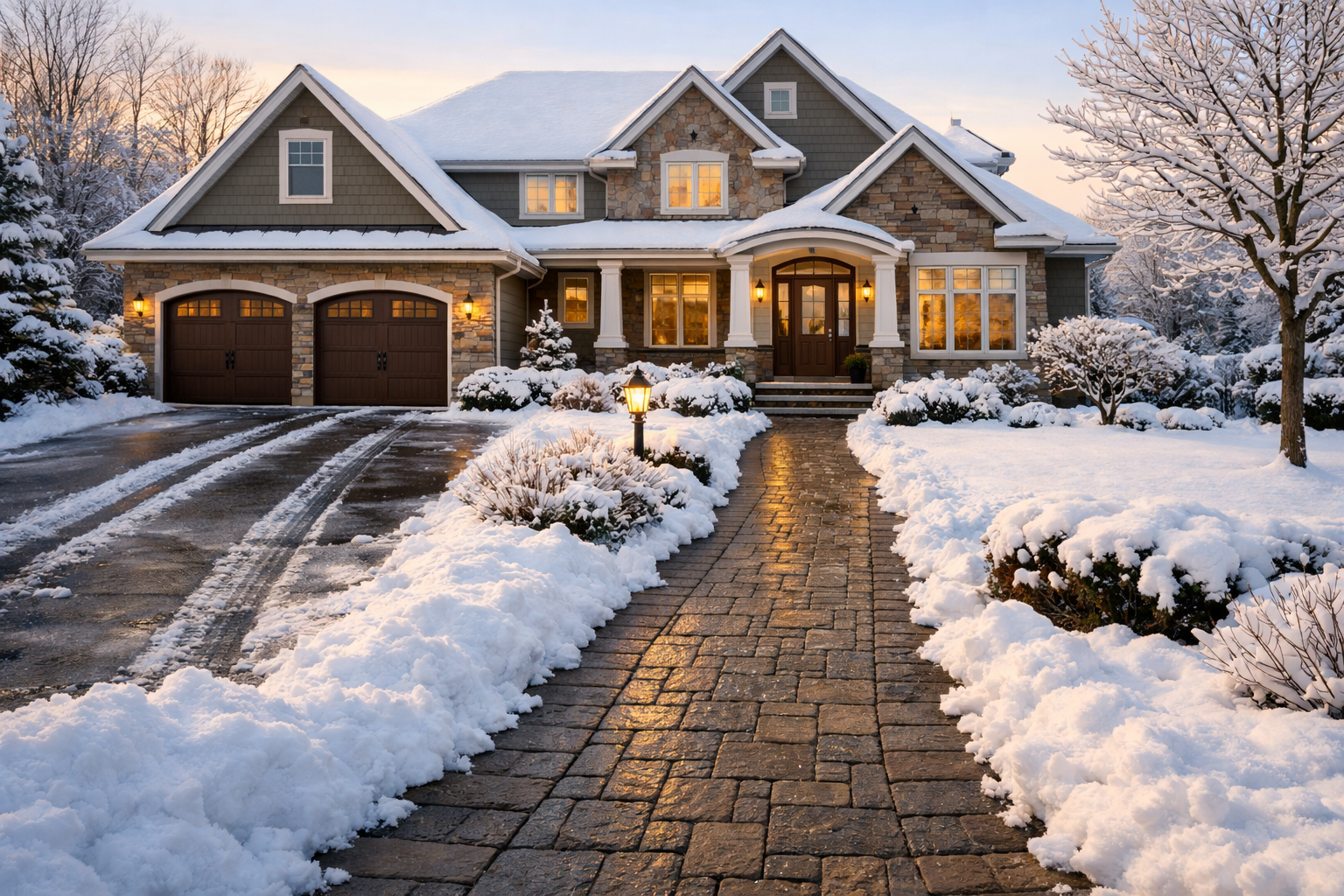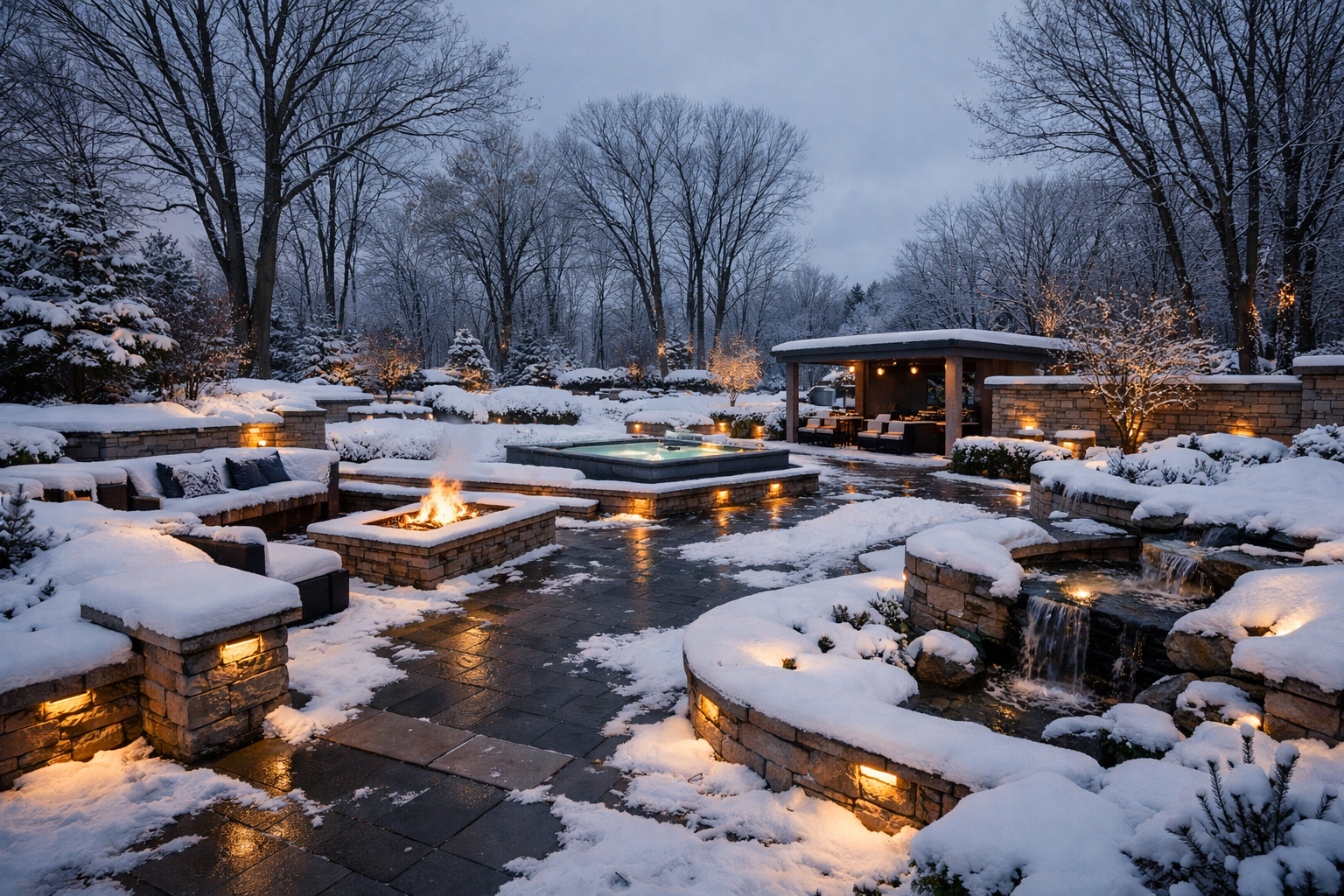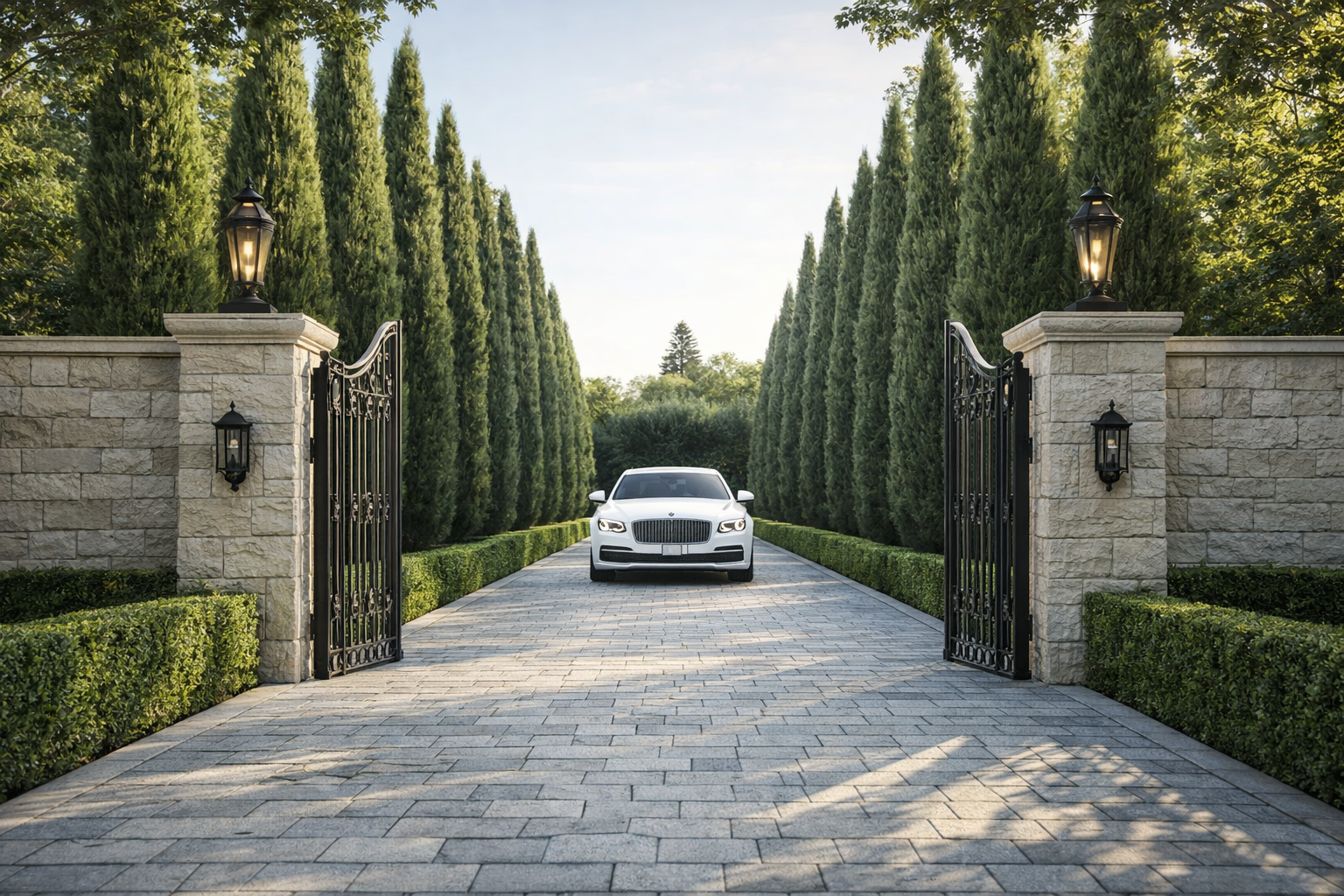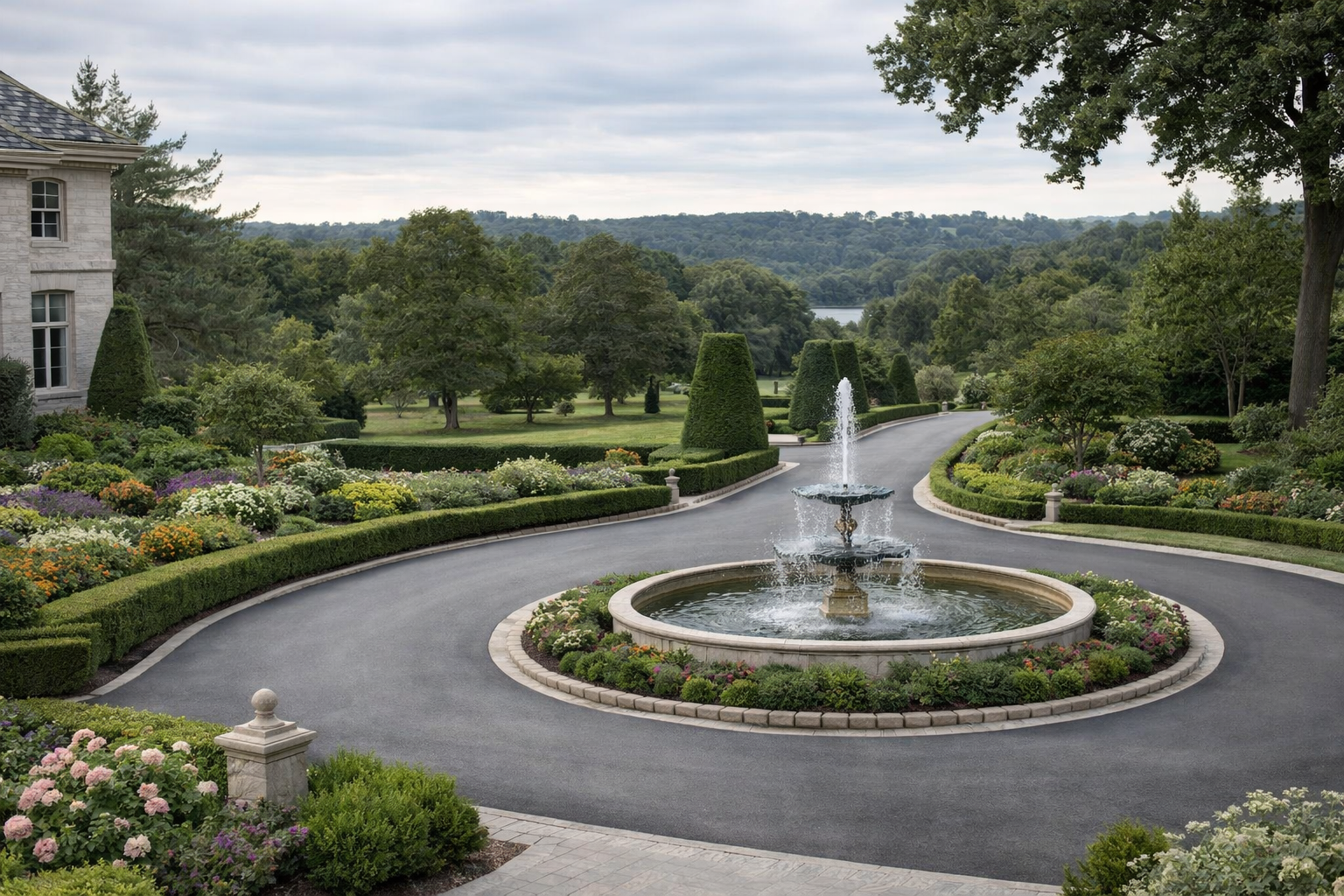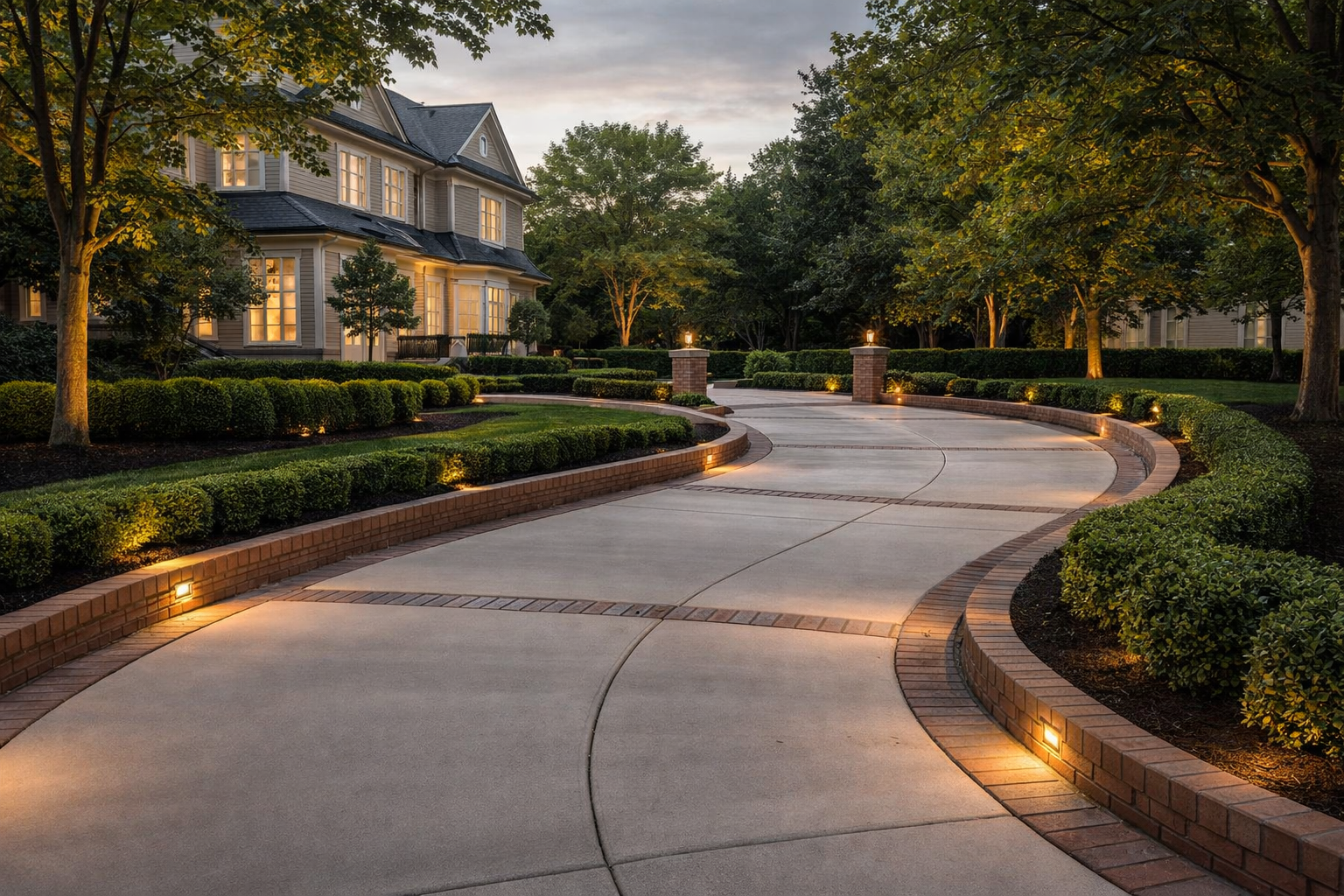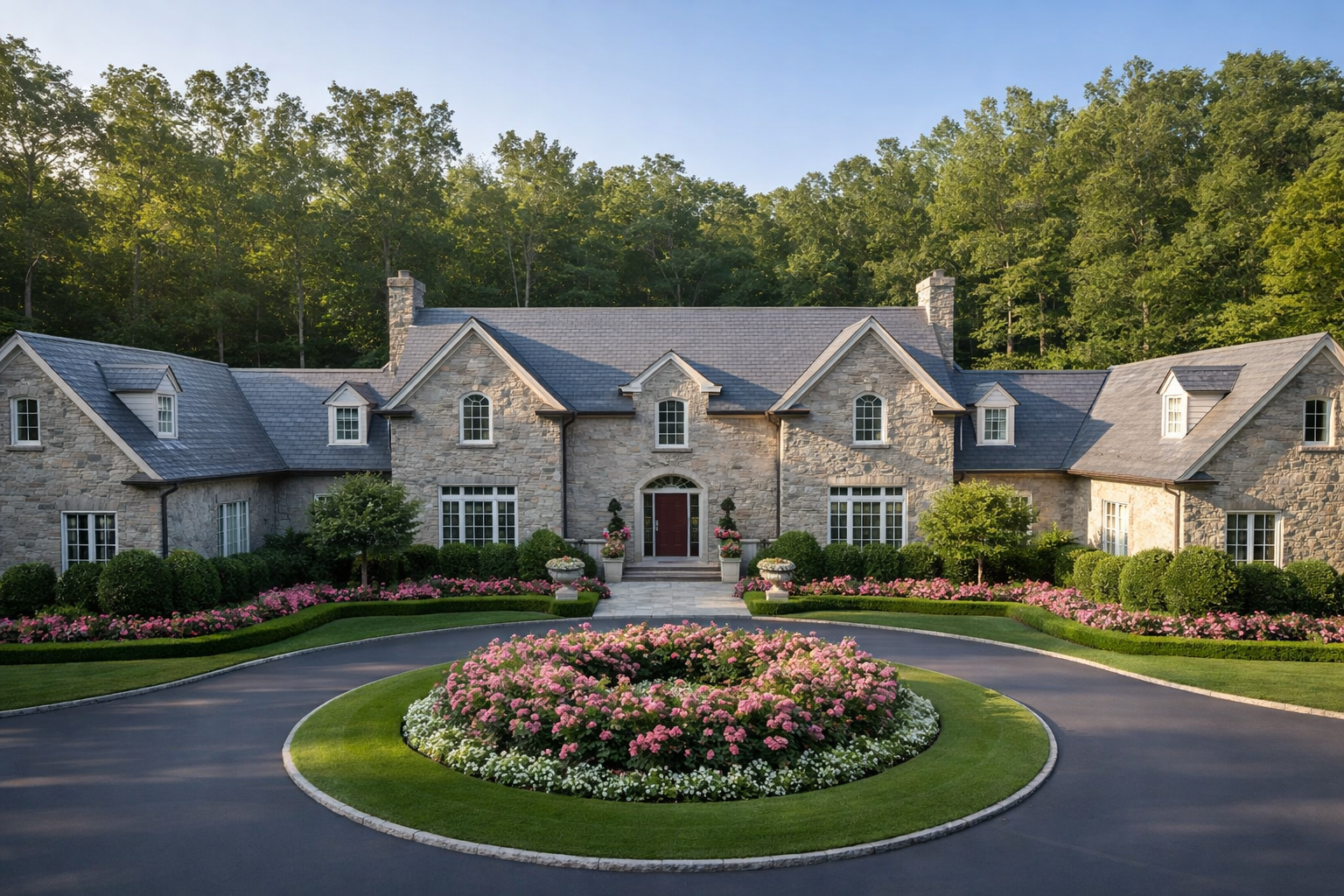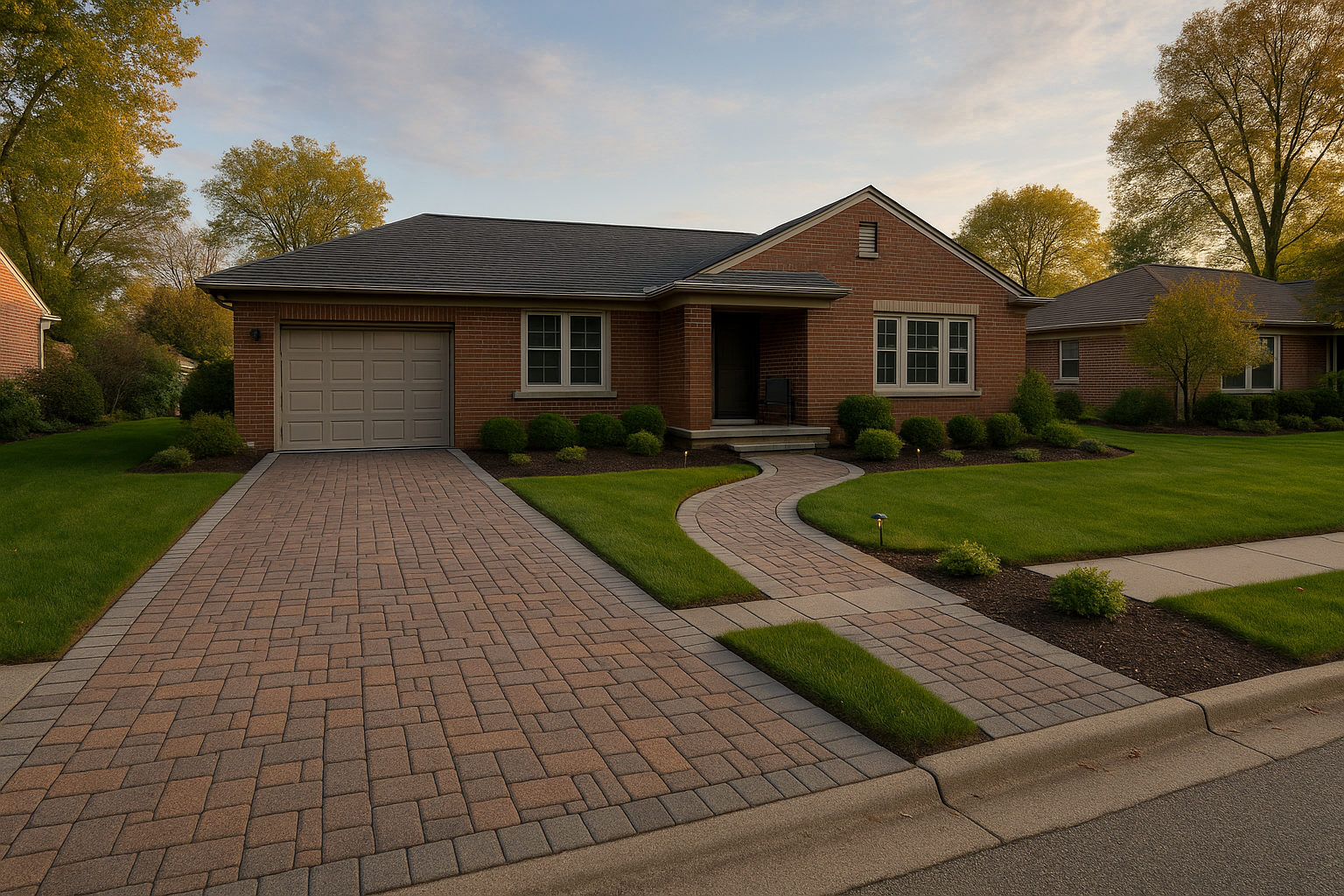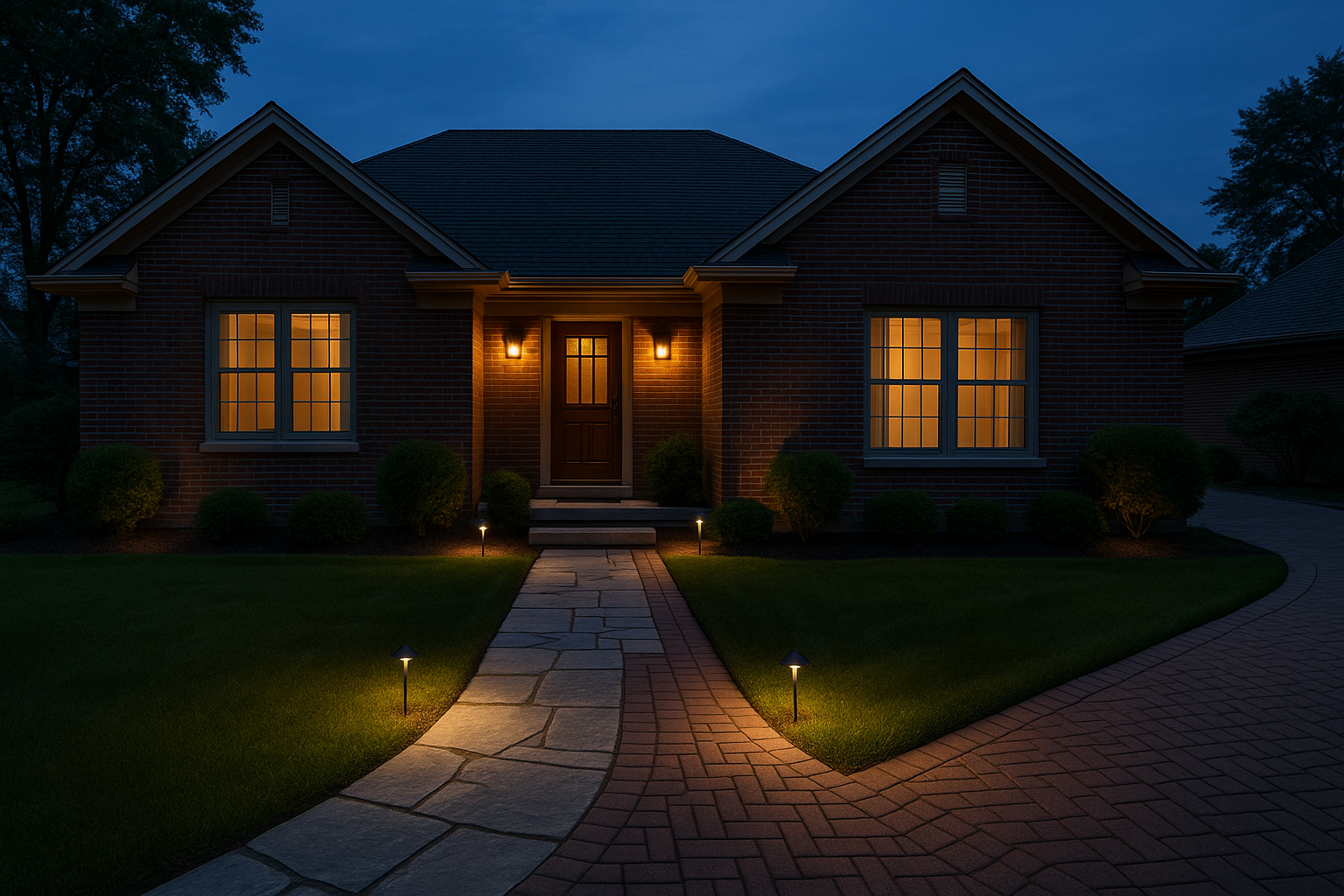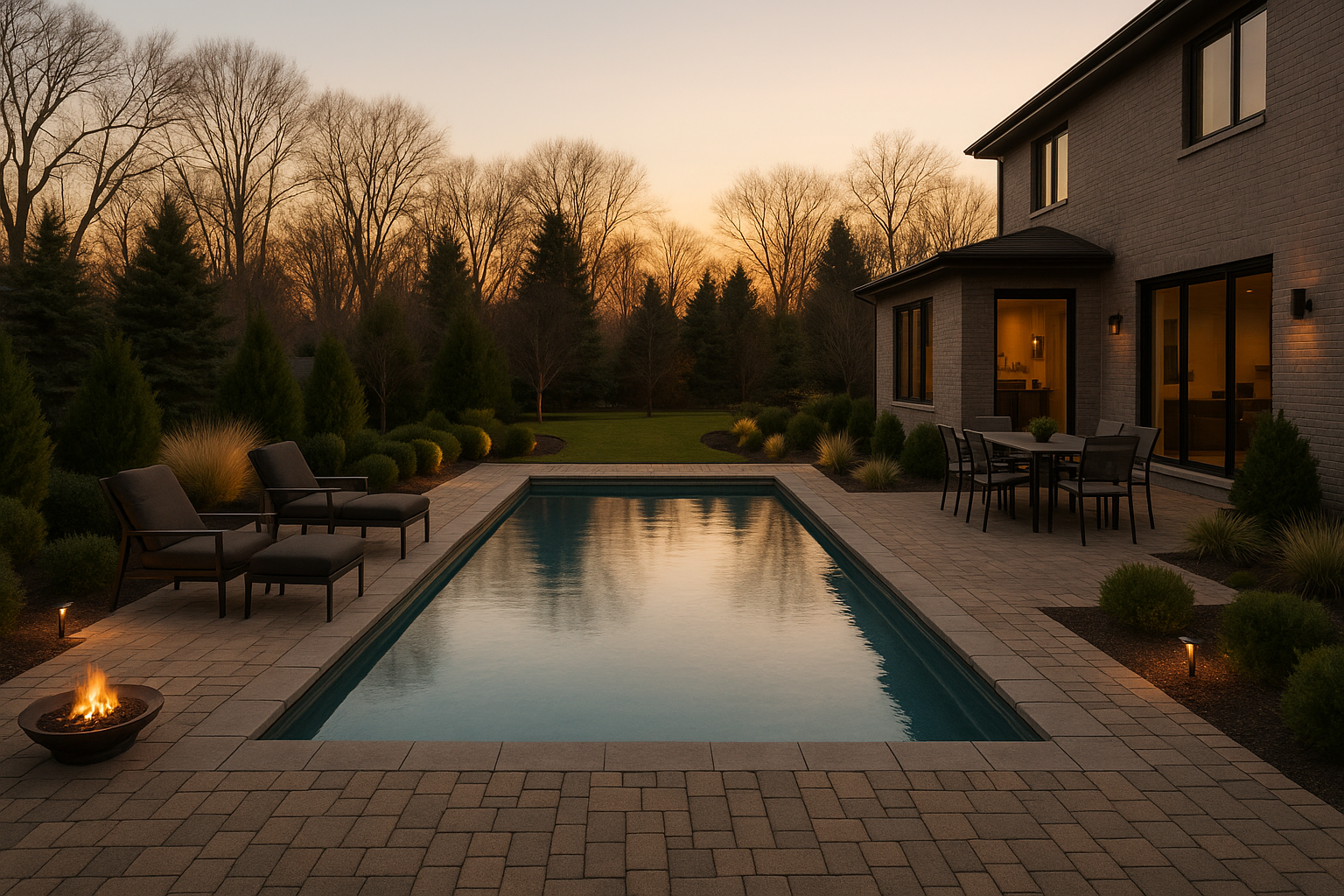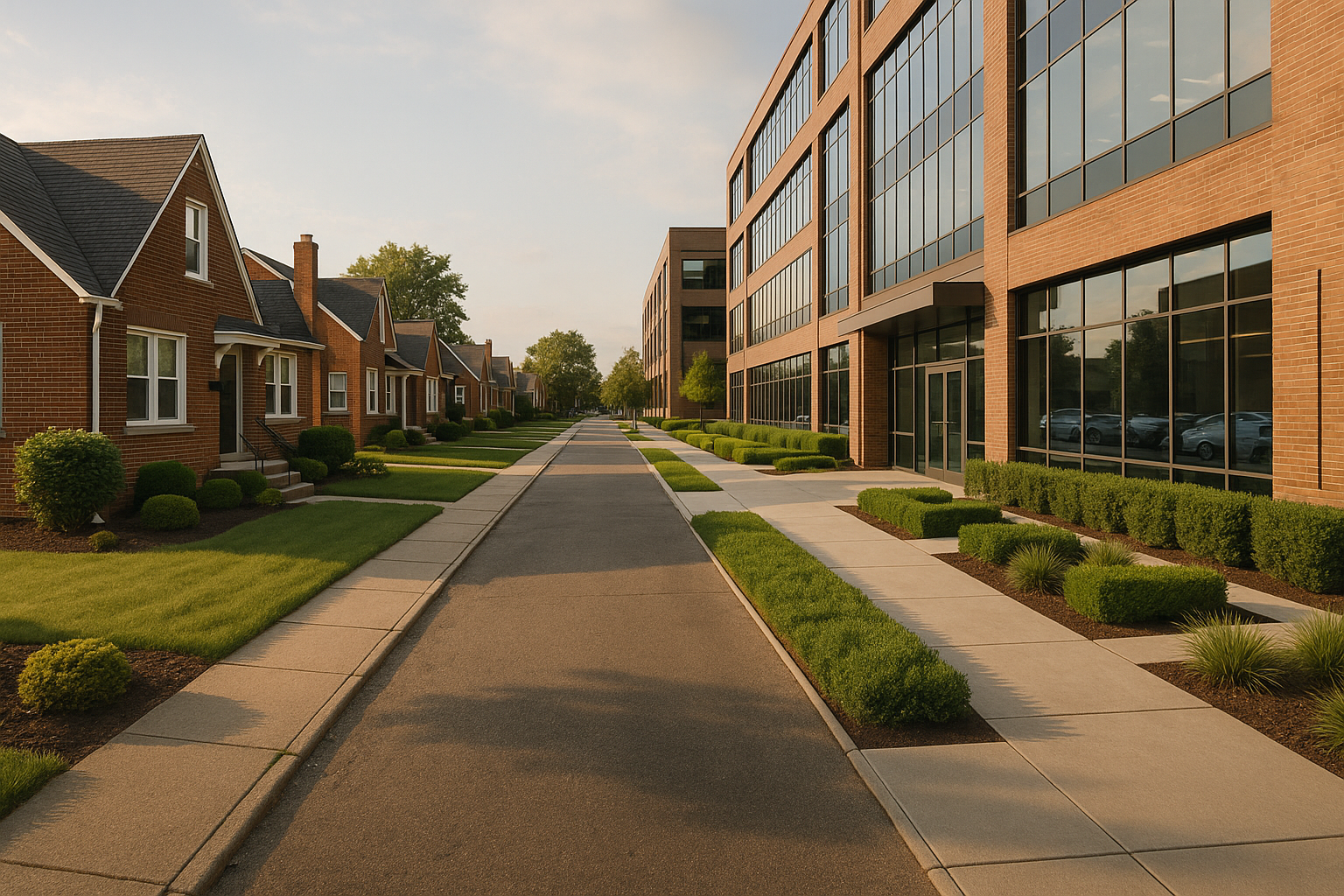Detroit Landscape Lighting For Luxury Homes
Elegance at night is a design decision. In Detroit and its close suburbs, the right outdoor lighting makes architecture read beautifully, keeps guests safe on slick evenings, and still works after the first lake effect blast. This is your expert plan for a system built by a true landscape lighting company that a discerning homeowner would find when searching for a landscape lighting company near me among top detroit landscaping companies. We will tune choices to our local daylight and weather, tie fixtures to thoughtful deck and patio design, and ensure the details stand up to Michigan winter.
Detroit first, always
Short days and real winters define how your lighting should work. Metro Detroit enters a long dark season in late fall and does not see truly long evenings again until late spring. December brings the earliest sunsets around five in the afternoon, so placement and control matter if you want warm welcomes and safe paths after work. Published sunrise and sunset records for Detroit confirm this seasonal squeeze, which is why scene based control and glare free optics are not luxuries here, they are standard. CBS NewsTime and Date
Climate facts that change design
The National Weather Service normals for Detroit show a wetter pattern from spring through late summer, a defined snowy period in winter, and variable shoulder seasons. Those rhythms dictate installation windows, cure times, and the way you protect wiring and joints during build out. Use them to schedule trenching and transformer work when ground and access cooperate. Weather.gov
Hardiness zone and edge planting
Lighting is part of a landscape, not separate from it. Detroit sits in the latest USDA Zone 6b in many neighborhoods, a shift upward from parts of the 2012 map. That zone influences which evergreen backdrops stand up behind path lights and which accent trees will thrive where salt spray is likely. Use the current USDA reference and a zip specific lookup as your plant filter. planthardiness.ars.usda.govGarden.org
In Detroit, luxury lighting is what you see and also everything you do not see, from burial depth to transformer placement to winter safe fixture locations.
What a luxury system looks like
Luxury is not just expensive fixtures. It is an elegant plan that blends architecture, horticulture, and electrical craft.
• Architectural intent first. Decide which facades and trees deserve a quiet wash and which deserve dramatic relief.
• Human experience next. Favor low glare pathways, even steps, and welcoming thresholds.
• Serviceability always. Place hardware where winter work and spring cleanups will not destroy it.
Core fixtures and where they shine
• Accent uplights for specimen trees and stone planes, beam choices from narrow to wide for proper throw
• Path and spread lights for safe walking without hot spots
• Step and hardscape lights tucked into risers and capstones for safety with zero glare
• Downlights for moonlight effects from mature canopies
• Specialty niche lights around water features and art
Kichler’s pro guides give simple beam spread rules of thumb that work well in practice. Narrow beams near thirty five degrees for taller targets and trunks, mid beams around twenty five to forty five degrees for most canopies, and wider beams near sixty degrees for broad forms and wall washing. Use warmer color temperatures around twenty seven hundred to three thousand Kelvin for residential work. These choices read refined in winter darkness and flatter brick and stone. Kichler+1
Controls that match how Detroit lives
The difference between a good system and a great one is control. Detroit’s earliest winter sunsets and long dark evenings mean you want scenes that adapt.
• Welcome scene at sunset with warm path lights and gentle facade wash
• Entertaining scene that raises intensity on terraces and kitchens but keeps edges soft
• Security scene that adds discrete perimeter light without glare into bedrooms
Modern LED controllers allow zoning, dimming, and even color when used carefully. FX Luminaire’s Luxor platform is a good reference for how zoning and dimming enable scene based design and timed shifts through the evening. FX Luminaire+1
Transformers should be near an exterior GFCI protected receptacle and located to minimize run lengths, which helps reduce voltage drop and cable size. Manufacturer manuals call this out explicitly, and they also remind installers to plan runs and gauge to keep every LED within its voltage sweet spot. FX Luminaire+1
The quiet engineering that makes it last
Wire gauge, runs, and voltage
LED fixtures want consistent voltage at the head. Most twelve volt systems aim to supply between ten and fifteen volts at each fixture, which requires planning for load and distance. Keep individual runs within a reasonable wattage envelope and select wire gauge accordingly. Leading manufacturers provide calculators and guidance to size cable and limit voltage drop so every path light and uplight matches in brightness. FX Luminaire+1
Burial depth and protection
Low voltage landscape lighting cable is typically buried at a minimum of six inches under the National Electrical Code rules for circuits under thirty volts installed with identified cable or raceway. Reputable electrical references and summaries confirm the six inch standard for listed low voltage lighting systems, with deeper requirements for higher voltage wiring. Use direct burial cable rated for outdoor use and keep joints above grade or fully sealed. Super Bright LEDsattachments.priuschat.com
Drainage around fixtures
Detroit clay soils hold water. Pair surface grading with gravel backfill at in ground fixtures so meltwater and spring rains do not sit against housings. Keep well lights out of chronic wet pockets unless the model is fully sealed and rated for that exposure. Michigan State University Extension’s work on salt and moisture stress is a helpful reminder that what harms plants also harms finishes over time. Agri Natural Resources College
Salt and winter operations
Along drives and near sidewalks, deicers and spray will reach plants and hardware. Choose salt tolerant plant species near plow paths and use corrosion resistant fixture finishes. MSU Extension lists hardy trees and shrubs that tolerate salt better in Southeast Michigan, including several deciduous and conifer options. Agri Natural Resources College
Where lighting meets deck and patio design
A luxury lighting plan does not float above the hardscape. It is woven through it.
• Tuck hardscape lights under stair treads and seat wall caps so steps and edges read clearly on icy nights
• Use low glare grazing to define masonry texture without hot spots
• Place tiny niche lights at column bases for cues without visible fixtures
• Pre sleeve for future appliances and heaters during patio work so cable paths stay hidden and protected
Reputable pro guides emphasize that hardscape lighting boosts both beauty and safety on steps and caps, which is especially relevant on winter nights. Bring that same thinking to kitchen zones and dining areas so entertaining is effortless even when the sun sets early. Kichler
Pathways, drives, and daily use areas
Paths should guide feet without glare. Use wider beams and lower outputs that overlap gently. At drives, coordinate with snow storage so fixtures survive plows and blowers. Keep path heads out of shoveled swaths or switch to flush options where impacts are likely. This balance of protection and beauty is how a system remains luxurious after the first winter.
Trees and facades that deserve a moment
Start with one or two hero trees. Use a narrow accent on the trunk and a second mid or wide beam for the canopy to create depth. Aim to avoid halos and scallops. For facades, soften brick and stone with a gentle wash rather than harsh floodlight. Kichler’s technique library is a helpful reference for beam choices and placement patterns that produce clean results. Kichler
Pool, spa, and water features with code in mind
Night water is beautiful. It is also regulated. The National Electrical Code sets specific rules for how close luminaires may be to pools and spas. In simple terms, most low voltage landscape luminaires belong at least ten feet from the water’s edge unless they are special listed models and you meet additional conditions. Newer code language allows certain listed low voltage luminaires closer than five feet when specific transformer and listing requirements are met. When in the five to ten foot zone, GFCI protection rules apply for many line voltage luminaires. Always work with listed gear and confirm distances on the plan before trenching. UL SolutionsPA Municipal Code AllianceElectrical License Renewal
For modest fountains and rills integrated with paving, the safest approach is to light the surrounding hardscape and plants while letting water reflect. Where code allows and products are listed, use purpose made niche or submersible fixtures.
This is where your lighting plan intersects poolside landscaping details like plant litter, sweeping paths, and service access. Choose evergreens that do not shed into the water and place fixtures where winter cover crews will not damage them.
Historic districts and when permits apply
Many Detroit neighborhoods sit within local historic districts where exterior changes are reviewed. The Historic District Commission has published security and lighting guidance that emphasizes retaining character defining historic fixtures and seeking review for new exterior equipment. If your home is in a district, plan lighting changes with that review in mind and avoid removing any original fixtures. For larger projects with walls or structures, coordinate with BSEED on permitting and plan review. The city’s permitting pages outline how building, electrical, and zoning rules can overlap. A professional team will navigate these early to keep your schedule clean. City of Detroit+2City of Detroit+2
Installation windows that reduce call backs
Schedule design work in winter and early spring, perform trenching and transformer work after the first true dry down, and leave a second project window in late summer into early fall. This timing respects Detroit precipitation and snowfall normals and gives you operating time before the deep cold. It also pairs well with planting windows in Zone 6b if you are integrating new trees and shrubs behind the lighting. Weather.govplanthardiness.ars.usda.gov
A working spec you can trust
Fixture selection
• Accent fixtures with interchangeable optics so you can fine tune beams between ten and sixty degrees during aiming
• Path fixtures with fully sealed LED modules and warm color temperature around twenty seven hundred to three thousand Kelvin
• Hardscape lights with sealed modules under capstones and in step risers
• Downlights with glare control accessories
Optics and output
• Start at twenty seven hundred Kelvin for a warm residential feel, reserving three thousand Kelvin for active outdoor kitchens and sport courts
• Keep uplight lumen output modest on brick and stone to avoid scorch and preserve detail
• Use wider beams on short walls and paths, narrower beams or cross aiming for taller trees and columns
Professional guides reinforce these ranges and the relationship between beam choice and target size. Kichler
Power and control
• Central transformer near a GFCI protected outlet
• Group fixtures into zones by distance and use heavier gauge wire for longer runs to control voltage drop
• Program scenes for welcome, entertaining, and late night security
Manufacturers document the voltage targets and offer calculators to keep runs balanced and brightness even. FX Luminaire+1
Wiring details
• Bury direct burial cable to a minimum of six inches and deeper where it crosses drives or areas of future excavation
• Use listed connections or above grade enclosures, never open splices in soil
• Label runs at junctions for easier service in spring
Authoritative NEC summaries and industry education resources confirm the six inch guidance for listed low voltage landscape lighting systems. Super Bright LEDs
A Detroit example
A Palmer Woods homeowner wanted a warm welcome on winter evenings and effortless summer entertaining. The house is brick with mature oaks and a long walk from drive to door. The Rohto team began with a quick daylight and weather audit, then mapped scenes.
• Welcome scene at sunset with low path light, a gentle facade wash, and a single accent on the canopy nearest the entry
• Entertaining scene that raised terrace light for dining and shifted the oak highlights to a wider beam for depth
• Late scene that dimmed most elements and kept a pair of low fixtures on for security
The electrical plan used a central transformer near a GFCI protected exterior outlet, three primary runs to limit voltage drop, and direct burial cable at proper depth. Fixtures were placed out of plow arcs and away from snow throw paths. At the curb, salt tolerant shrubs framed the walk so winter operations would not kill the edge planting. The historic character of the facade was preserved by retaining original sconces and keeping new fixtures quiet and concealed. The system ran through one winter without a service call and now functions like a part of the house.
Quick Q and A
What color temperature should I choose for a classic brick home
Start at twenty seven hundred Kelvin for brick and most plant material. Step to three thousand in active areas if you want slightly crisper tone for task use. Manufacturer guides and lighting practice point to warmer light for most residential exteriors. Alcon Lighting
How deep should the wire be buried
Listed low voltage landscape lighting cable is typically buried at a minimum of six inches in soil, with deeper requirements for other wiring methods and locations. Always follow the instructions and local inspector guidance. Super Bright LEDs
Do I need a permit for lighting upgrades in Detroit
If your home sits within a local historic district, most exterior changes, including lighting, require review. Larger structures or related work may trigger permits. Check an address early with BSEED and the Historic District Commission. City of Detroit+1
How close to a pool can I place landscape lights
As a general rule, most low voltage landscape luminaires should be ten feet or more from the water unless listed and installed under very specific NEC allowances. When in doubt, stay outside ten feet and call in a specialist. UL Solutions
Troubleshooting that prevents call backs
• Map your cable runs and zone labels in a simple plan file and store photos of terminations. This makes future service and upgrades much faster. Kichler
• If a path looks patchy, you likely need closer spacing or wider optics.
• If an accent looks harsh, drop lumen output or widen the beam and aim slightly across the surface instead of straight on.
• If a section is dim, check for voltage drop on a long run and increase gauge or split the run.
• If fixtures near salt zones show wear, clean in spring and move to more corrosion resistant finishes.
A mini field checklist for Detroit installs
• Confirm service location and GFCI for transformer
• Verify wire gauge by distance and load, calculate voltage drop
• Bury cable to the correct depth and protect crossings
• Aim and focus with attention to winter operations and snow lines
• Use warm CCT for architecture and plant material, crisper tones for task zones
• Document zones, runs, and fixture types in a simple plan
• For homes in historic districts, submit a tidy packet with photos and fixture cutsheets for review before any work starts City of Detroit
Glossary
Accent uplight
A directional fixture that throws a controlled beam upward, used to reveal form and texture in trees and walls
Beam angle
The spread of light from a fixture measured in degrees, narrow beams highlight tall thin targets while wider beams wash broader areas Kichler
CCT
Correlated color temperature measured in Kelvin that describes the warm or cool appearance of the light, with twenty seven hundred to three thousand Kelvin typical for residential exteriors Alcon Lighting
Direct burial cable
Outdoor rated cable designed to be installed in soil without additional conduit, often labeled UF or DBR
GFCI
A ground fault circuit interrupter that shuts power when it detects a dangerous difference in current, required for outdoor receptacles that serve transformers powering low voltage lighting systems FX Luminaire
Voltage drop
A reduction in voltage along a cable run due to resistance, managed by wire gauge and run length so all fixtures receive proper power FX Luminaire
Why this plan positions Rohto above the rest
Among detroit landscaping companies you will notice two approaches. One focuses on quick fixtures and thumbnails. The other treats lighting as part of an architectural and horticultural system. Rohto is in the second group. We design scenes around how you live, use optics that flatter Detroit materials, bury and protect wiring to code, and plan for winter operations and spring service. This is how a luxury system keeps its quiet confidence year after year. It is also why our lighting plans integrate seamlessly with residential landscaping and with deck and patio design so the whole property feels composed.
Closing Statement
A luxury lighting system in Detroit is not an accessory. It is the nighttime face of your home and a quiet safety net during the long dark months. When you ground choices in local daylight and weather, size power and cable to keep LEDs in their sweet spot, select warm optics that flatter brick and stone, and respect city rules and historic context, the result feels inevitable. If you want a partner that builds lighting like architecture and services it like a long term asset, choose the landscape lighting company that understands our city. Let us bring refined light to your entries, paths, terraces, and water features, all tuned to the way you live.
Request a custom design from Rohto Landscaping

